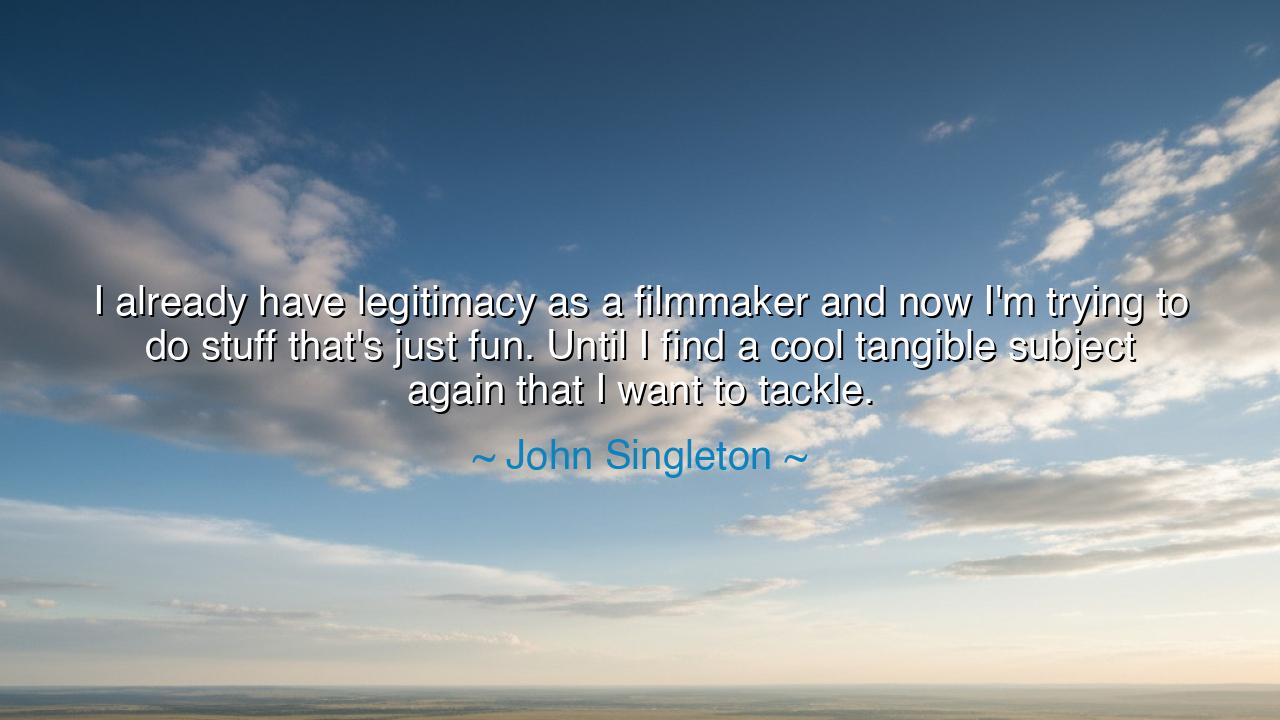
I already have legitimacy as a filmmaker and now I'm trying to do
I already have legitimacy as a filmmaker and now I'm trying to do stuff that's just fun. Until I find a cool tangible subject again that I want to tackle.






In the annals of human achievement, few pursuits are as personal and yet as deeply influential as the art of creation. Whether through the brushstrokes of a painter, the verses of a poet, or the frames of a filmmaker, creation is an act of both expression and exploration. It is an act that reveals the inner world of the artist, as much as it shapes the world around them. Thus, the words of John Singleton, “I already have legitimacy as a filmmaker and now I’m trying to do stuff that’s just fun. Until I find a cool tangible subject again that I want to tackle,” reveal a profound understanding of the creative process, and a subtle yet powerful lesson for all who embark on the path of artistry.
Singleton speaks to the balance every artist must strike between achievement and freedom. In his assertion that he already possesses legitimacy, he acknowledges the struggles and triumphs of having built his reputation, having established his place in the world of filmmaking. In this, he hints at an ancient truth: true mastery is earned, not simply given. Yet, what follows is equally important—the notion that once legitimacy is established, the artist is no longer bound by the expectations of others, nor by the weight of prior accomplishments. Freedom comes not from the pursuit of acclaim but from the liberation to explore what pleases the soul. This is the moment when art ceases to be a duty and becomes an adventure, where the artist is free to create not for necessity, but for joy.
The ancient Greeks, with their reverence for the arts, understood this well. They saw creation not only as a means of immortalizing their gods and heroes but also as a reflection of individual expression. Consider the example of the great philosopher Socrates. Though renowned for his wisdom, Socrates often retreated from the world of formal dialogue to engage in conversations that were driven by personal curiosity and the joy of exploration. Similarly, John Singleton’s statement speaks to a profound shift in the artist’s journey—a transition from the weight of expectation to the lightness of play. It is in this phase of creative freedom that the artist is most able to reconnect with the pure joy of creation, to explore without limits, and to create not out of obligation, but because it stirs their spirit.
This lesson echoes through the ages. Consider the journey of Leonardo da Vinci, a man whose genius spanned painting, anatomy, engineering, and more. While his masterpiece, the Mona Lisa, granted him eternal recognition, it is said that Leonardo often pursued side projects for his own amusement. He tinkered with inventions, drew fantastical machines, and explored subjects that brought him joy, not recognition. The pursuit of fun and creativity without constraint or expectation led to the most profound discoveries of his time. In his case, as in Singleton's, the freedom to explore and to create for the sheer pleasure of it became the wellspring from which his greatest work flowed.
What Singleton's words teach us is not that legitimacy should be disregarded, but rather that once it is achieved, it is the moment to embrace play and experimentation. For the true artist, the next great work will not be dictated by the desire for fame or approval, but by the inner spark that drives them to tackle new subjects, to ask new questions, and to engage in the joyful pursuit of creative expression. To constantly seek a “cool, tangible subject” is to embrace the boundless potential of creativity itself, to allow oneself to wander the vast landscape of possibility until something unexpected ignites the imagination.
The ancient Chinese philosopher Laozi once spoke of the importance of non-action, or wu wei—not in the sense of doing nothing, but in allowing action to flow naturally from the heart. Similarly, Singleton’s words remind us that the best creations often come when we cease forcing them into being and allow them to emerge from spontaneous joy. The artist must not be enslaved by the pressure of expectation but instead must create from a place of freedom, unburdened by the weight of prior successes. It is this freedom that nourishes the artist's soul and leads to works that resonate deeply with others.
And so, to the creators of today and of the future, let this lesson resonate: legitimacy is a step, not the end. The true beauty of art is found not in the pursuit of external accolades but in the freedom to create from a place of joy and curiosity. Like John Singleton, do not hesitate to step away from what is expected of you and embrace the fun. Seek out subjects that excite your spirit, and in doing so, you will find that the most profound and enduring works of your life will be born from a place of play, not pressure.






AAdministratorAdministrator
Welcome, honored guests. Please leave a comment, we will respond soon